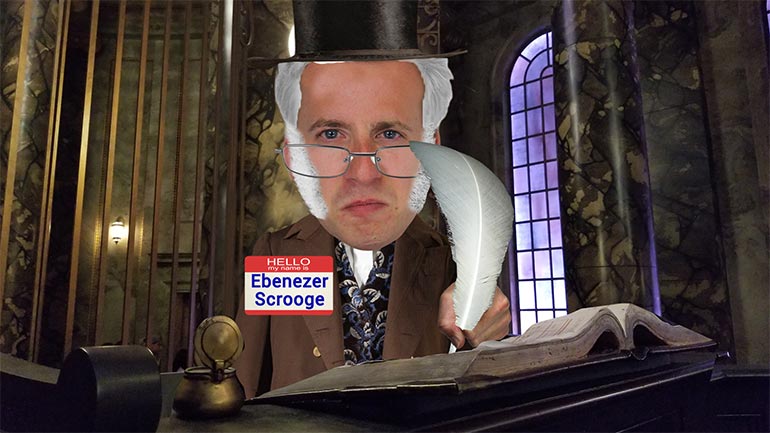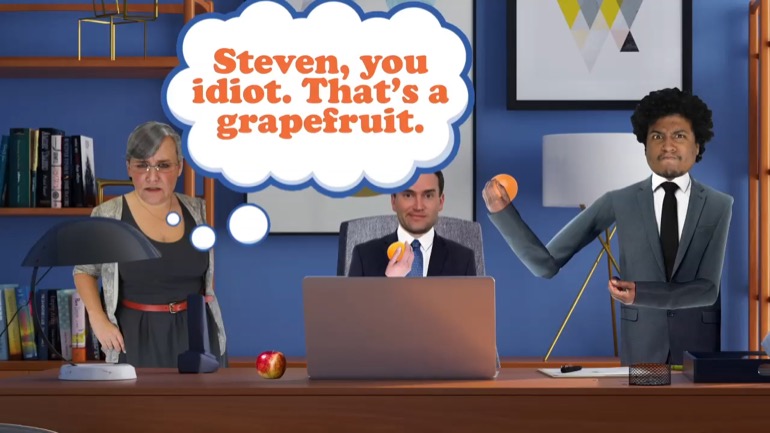ShmoopTube
Where Monty Python meets your 10th grade teacher.
Search Thousands of Shmoop Videos
International Videos 92 videos
What is the Advance Decline Ratio? The advance decline ratio is used to determine how the market performed on a given day. It does this by comparin...
A strong dollar is one that has earned trust on an international scale. It reflects a reliable currency...at least, more reliable than that of othe...
What is the Dow Jones Industrial Average? The Dow Jones Industrial Average is usually just called the Dow. It’s an average of 30 of the most well...
Finance: What is a Line of Credit? 134 Views
Share It!
Description:
What is a line of credit? A line of credit is kind of like a loan. A bank gives a borrower a line of credit, which basically says they can borrow “x” amount of money, and then the borrower can take that money at any time they please. As long as they don’t take more than the maximum amount outlined by the line of credit, of course.
- Social Studies / Finance
- Finance / Financial Responsibility
- Life Skills / Personal Finance
- Finance / Finance Definitions
- Life Skills / Finance Definitions
- Finance / Personal Finance
- Courses / Finance Concepts
- Finance and Economics / Terms and Concepts
- Subjects / Finance and Economics
- Terms and Concepts / Accounting
- Terms and Concepts / Banking
- Terms and Concepts / Bonds
- Terms and Concepts / Company Management
- Terms and Concepts / Credit
- Terms and Concepts / Derivatives
- Terms and Concepts / Econ
- Terms and Concepts / Ethics/Morals
- Terms and Concepts / Financial Theory
- Terms and Concepts / Forex
- Terms and Concepts / Incorporation
- Terms and Concepts / International
- Terms and Concepts / Investing
- Terms and Concepts / Managed Funds
- Terms and Concepts / Metrics
- Terms and Concepts / Muni Bonds
- Terms and Concepts / Mutual Funds
- Terms and Concepts / Regulations
- Terms and Concepts / Stocks
- Terms and Concepts / Tech
- Terms and Concepts / Trading
- Terms and Concepts / Trusts and Estates
- Terms and Concepts / Wealth
- College and Career / Personal Finance
Transcript
- 00:00
finance a la shmoop what is a line of credit? oh I'll definitely pay it back. [ man talks to camera]
- 00:08
yeah, that's a line of credit, but it's just a line like can I buy you a drink
- 00:13
or do you come here often or I bet my mother would love you, in financial real
- 00:19
life a line of credit or LOC if you just like using acronyms to make yourself
- 00:23
seem are keenly smart, is deb,t or rather an LOC is an option to take on debt. why [man in front of power point]
Full Transcript
- 00:30
would somebody want an option to take on debt? well here's why.
- 00:34
yep companies can't ordain their futures. they don't know what's coming .but paying
- 00:38
a few bucks today for financial life insurance tomorrow is usually a really
- 00:42
good idea because the skies are not always sunny all day. so a company that [robot assembly line]
- 00:47
makes shoelace tying robots might be doing great today but there's a big fat
- 00:52
product release coming and they have no idea if it'll do well right away or take
- 00:57
three years to catch on. or you know rip people's feet off well who knows, maybe
- 01:03
people will actually be able to tie their own shoelaces by then. what do you
- 01:06
think America? how are we doing but yeah it's unpredictable this sort of thing [man sits on a couch]
- 01:11
happens to tech companies all the time. so while the company doesn't need cash
- 01:15
today they may need it in the future .so they pay a bank or lender a small token
- 01:20
amount in return for that lender guaranteeing that the money will be
- 01:24
there at a set price in rent and set terms at some point in a defined future.
- 01:29
ie the next three years or something like that. that is, you know prevailing
- 01:33
rates or five percent they might pay half a percent to guarantee they can
- 01:36
borrow it 10 million dollars at 5% but, we'll get into. that all right if a [smiling man on the phone]
- 01:40
company does in fact decide to exercise its option to draw down cash from its
- 01:44
line of credit or rather to get the bank to wire the cash they have reserved into
- 01:48
the company's own bank account then usually it just starts paying interest
- 01:52
or rent on the money the day it's borrowed, just like it would have if it
- 01:55
borrowed money at the outset. well why wouldn't a company just borrow money
- 01:59
today and have it stuffed under its mattresses? [woman holds a stash of cash]
- 02:02
well because almost always the option to draw down money costs a fraction of the
- 02:07
interest it would cost to actually borrow the money itself. so we have a
- 02:12
company who wants the right to borrow ten million bucks and
- 02:15
they're willing to pay half a percent per year for a guarantee to be able to
- 02:20
borrow that money I'd say five percent per year when or if they borrow it. if
- 02:25
they never borrow it that half a percentage is wasted. [definitions on the screen]
- 02:28
well the half a percent line of credit option fee is 50 grand a year and let's
- 02:32
say two years go by in the company doesn't need the money.
- 02:35
they've just wasted that fifty grand a year each year. but then they borrow all
- 02:39
of it in year three and guess what in those three years interest rates went up
- 02:43
two percent 3 percent four percent something like. that yeah it could happen.
- 02:47
so the company paid 100 grand for the option to borrow the money at five [equations ]
- 02:50
percent interest, and yes that hundred grand is a lot of dough ,but compare it
- 02:54
with the cost of borrowing had the company borrowed all ten million right
- 02:58
away. well had they done that they would have paid five percent per year in
- 03:01
interest on that ten million bucks or five hundred grand a year and that's
- 03:06
times two years .so it would have cost them a million dollars in interest had
- 03:10
they borrowed all the money right away. instead miserly wiserly, they only [man scribbles with a pen]
- 03:15
paid a hundred grand for the option for two years because they didn't need the
- 03:19
money right away and that line of credit structure saved them nine hundred
- 03:23
thousand dollars in borrowing costs. a nice job mr. CFO. so why isn't it free to [thumbs up]
- 03:29
just reserve a line of credit with a bank? like why do they charge anything
- 03:33
when they're not actually loaning out money today? well the bank has to
- 03:37
allocate gets finite resources to accommodate that line of credit drawdown.
- 03:41
sure enough Murphy's Law happens at work and the company will want to exercise
- 03:45
the LOC and draw down the money from the bank at just the worst time in history [woman frowns in front of a bank vault]
- 03:50
like say in the middle of 2008 or 9, when nobody had anything right. okay.
- 03:57
well banks have tightly regulated laws or covenants around which they can
- 04:00
borrow money from the Fed or the government at say 2%, then mark it up to
- 04:05
4% and lend it out. and they make money on that spread right? so if the bank had
- 04:10
tons of LOCs out there it could be bad news if they weren't charging a little [hands reach for cash]
- 04:14
something for them. and no a credit card essentially is a line of credit you fill
- 04:20
out a bunch of forms swear and then pinkie swear to pay back the money .if a
- 04:25
month goes by and you don't pay back the money you owe well then you
- 04:29
get charged enormous rates for borrowing. it but if you do pay it back, the rates
- 04:33
are really low maybe you have a small annual fee although most credit cards,
- 04:37
they don't even have those anymore. but more directly, the fee is paid by the merchant
- 04:41
ie the earring store that sold you the seven belly button rings for forty bucks. [ pierced and tattooed woman holds document]
- 04:45
each in the form of a transaction fee that is, the $280 you would have spent on
- 04:50
a constellation for your stomach, the merchant paid the credit card company
- 04:54
about 1% or 280 for managing the bank in that transaction. what about as much as
- 04:59
you're gonna be spending on cotton swabs and antibacterial soa.p I hope you
- 05:04
weren't planning on wearing a tube top anytime soon. anyway that's a line of
- 05:08
credit .use it wisely. it can bite you [woman with red stomach grimaces]
Related Videos
GED Social Studies 1.1 Civics and Government
What is bankruptcy? Deadbeats who can't pay their bills declare bankruptcy. Either they borrowed too much money, or the business fell apart. They t...
What's a dividend? At will, the board of directors can pay a dividend on common stock. Usually, that payout is some percentage less than 100 of ear...
How are risk and reward related? Take more risk, expect more reward. A lottery ticket might be worth a billion dollars, but if the odds are one in...
































































































